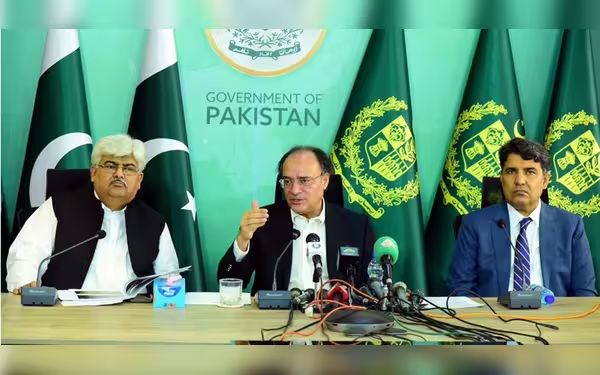Friday, October 4, 2024 10:37 AM
Pakistan's Finance Minister Declares War on Cash Economy
- Finance Minister emphasizes urgent need to combat cash economy.
- New tax measures include bans for non-filers on financial transactions.
- Government aims for a documented economy to enhance revenue collection.
 Image Credits: dailytimes_pk
Image Credits: dailytimes_pkPakistan's Finance Minister calls for a war on the cash economy to enhance tax compliance and economic growth.
The cash economy in Pakistan has long been a topic of concern for the government, as it hampers tax collection and economic growth. Recently, Finance Minister Muhammad Aurangzeb emphasized the urgent need to combat this issue, stating that the government must declare "war on cash economy". This statement comes in light of the significant increase in tax filers for the current fiscal year, which has nearly doubled compared to last year. Approximately 723,000 new filers have registered, indicating a positive shift towards a more documented economy.
On September 20, Prime Minister Shehbaz Sharif approved stringent measures aimed at enhancing tax enforcement and compliance. One of the most notable actions includes a ban on all banking and financial transactions for individuals who have not filed their tax returns. During a press conference in Islamabad, Aurangzeb remarked, "I think it is important that we, as a government, are walking the talk." This statement reflects the government's commitment to ensuring that all citizens contribute their fair share to the national revenue.
The Finance Minister also highlighted a concerning report presented by the Federal Board of Revenue (FBR) chairman, which revealed an estimated tax evasion of Rs1.3 trillion among individuals who underfile their taxes. Aurangzeb stated, "I think I’ve already talked about that we have to declare war on cash in this country." He further explained that the cash-in-circulation in Pakistan is around Rs9 trillion, while the FBR's budget stands at Rs9.3 trillion. This discrepancy suggests that the actual size of the economy could exceed $700 billion, underscoring the importance of transitioning to a documented economy.
For non-filers, the consequences of non-compliance are becoming increasingly severe. Aurangzeb warned that "they will not be able to, going forward, buy vehicles, properties, mutual funds, and [open] current bank accounts – they will have difficulties in cash withdrawals and deposits." This approach aims to incentivize individuals to file their taxes and contribute to the economy. Additionally, the government plans to reduce human intervention in tax collection by creating a digital interface. This digital algorithm will help identify discrepancies between declared income and actual assets, ensuring a fairer tax system.
In addressing inflation, Aurangzeb noted that it has decreased to single digits and is expected to "subside more". This positive trend is attributed to the successful completion of the stand-by agreement with the International Monetary Fund (IMF). The Finance Minister emphasized that a new and extended IMF program is crucial for maintaining macroeconomic stability and implementing necessary structural reforms. The IMF Executive Board recently approved a 37-month $7 billion Extended Fund Facility, which is the 24th payout since 1958, in exchange for unpopular reforms aimed at broadening the tax base.
Both the Prime Minister and the Finance Minister have expressed their determination that this will be the last IMF program Pakistan engages in. Aurangzeb reiterated this sentiment, stating that achieving macroeconomic stability is critical if the country is to avoid future reliance on the IMF. He remarked, "Because this isn’t a theory anymore, we are seeing the results of this macroeconomic stability," highlighting the ongoing reforms in the energy sector and privatization efforts.
Furthermore, the Finance Minister is overseeing a rightsizing initiative aimed at reducing federal expenditures. He revealed that six ministries are currently being ratified for this purpose, with one ministry, the Capital Authority, set to be abolished. This move is part of a broader strategy to streamline government operations and enhance fiscal responsibility.
The government's aggressive stance against the cash economy and its commitment to tax compliance signal a pivotal moment for Pakistan's economic landscape. By fostering a documented economy, the government aims to enhance revenue collection, reduce tax evasion, and ultimately pave the way for sustainable economic growth. As these measures take effect, it will be crucial for citizens to understand their role in this transformation and the benefits that a more transparent economy can bring to the nation as a whole.













